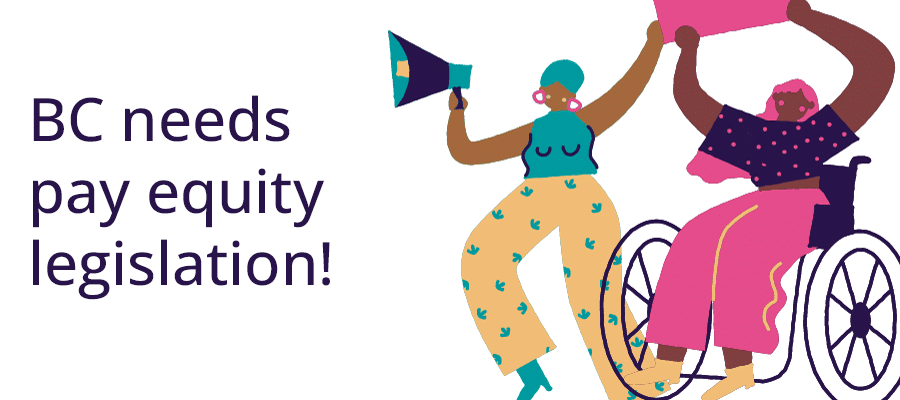We know BC has a gender pay gap – it’s time to do something about it

This article is excerpted from an open letter released today by a coalition that CCPA-BC helped to convene, and that includes Indigenous organizations, workers’ rights groups, labour unions, law and policy advocates, researchers and community leaders. Want to add your voice to the call? Individuals can sign on here, and organizations can join the list of signatories here.
BC has one of the worst gender pay gaps in Canada. Any day, we expect the provincial government to unveil new pay transparency legislation, which would require employers to report on gender-based differences in pay but wouldn’t require them to do anything about it.
Today, more than 125 leading BC organizations, academics and advocates are calling on the government to also introduce a Pay Equity Act. Such an Act would enshrine in law the responsibility of all employers to identify and close gaps in pay for work of equal value.
Women and people who are marginalized because of their gender are being systematically underpaid for work of equal value, compared to the wages their male counterparts earn. This is especially true for people who are Indigenous, Black, racialized, and those who have a disability or are otherwise marginalized.
As a province with obligations under the federal United Nations Declaration on the Rights of Indigenous Peoples Act and BC’s Declaration on the Rights of Indigenous Peoples Act—and with numerous Reconciliation Agreements with Indigenous nations—the wage gap between Indigenous peoples and the rest of the population represents a disparity in Canada’s legislative intent and hollow reconciliatory words versus a commitment to action. Numerous studies have shown higher rates of unemployment among Indigenous populations, with those registered as First Nations suffering the largest wage disparity.
Pay transparency is not enough to eliminate systemic discriminatory pay differences, but designed well, it could help lay the groundwork for a robust pay equity system:
- A robust enforcement regime. The pay transparency legislation should include oversight and accountability mechanisms that ensure employers are complying with the law. It cannot be voluntary. Employers who do not comply should be named publicly and should face fines of a size sufficient to change their behaviour.
- Transparency in all aspects of compensation. The legislation should require transparency of total annual compensation including all bonuses and non-monetary benefits and perks. This information should be tied to job titles and descriptions of core duties. Understanding total compensation is necessary to ensure pay equity.
- Broad application across the economy. Pay transparency should be mandatory for all employers with 10 or more employees across all sectors. Pay equity is needed in organizations of all sizes.
- A data system built to support pay equity. The legislation must provide for the storage of pay data in a central repository that supports the analysis necessary for a future pay equity regime.
- A single interface for public access to data. The legislation should make data available to the public through one easily searchable online interface.
- Disaggregation of data for deeper analysis. Data should be collected so that it can be disaggregated by individual demographic characteristics including gender, disability, age, race, Indigeneity, place of origin and family status, as well as by region, sector and occupation groups. The data must be stored in a way that allows researchers to understand the links between identity factors. This will support pay equity by revealing gaps between and within areas of the economy where equity-deserving groups are over- or under-represented.
- Worker protections as well as transparency. The legislation should include worker protections linked to greater pay equity – requiring employers to include compensation details in all job postings, not allowing employers to ask job candidates about their prior compensation and preventing retaliation against employees who choose to reveal their compensations levels to others.
- A new Pay Equity Office to lead implementation. An office providing expertise in pay equity is needed to support these priorities and to oversee a future pay equity regime.
Pay transparency legislation alone will not secure the right to equal pay for work of equal value unless it is followed by a true Pay Equity Act. One discloses the issue, the other addresses it.
Topics: Employment & labour, Racism & racial justice, Women


